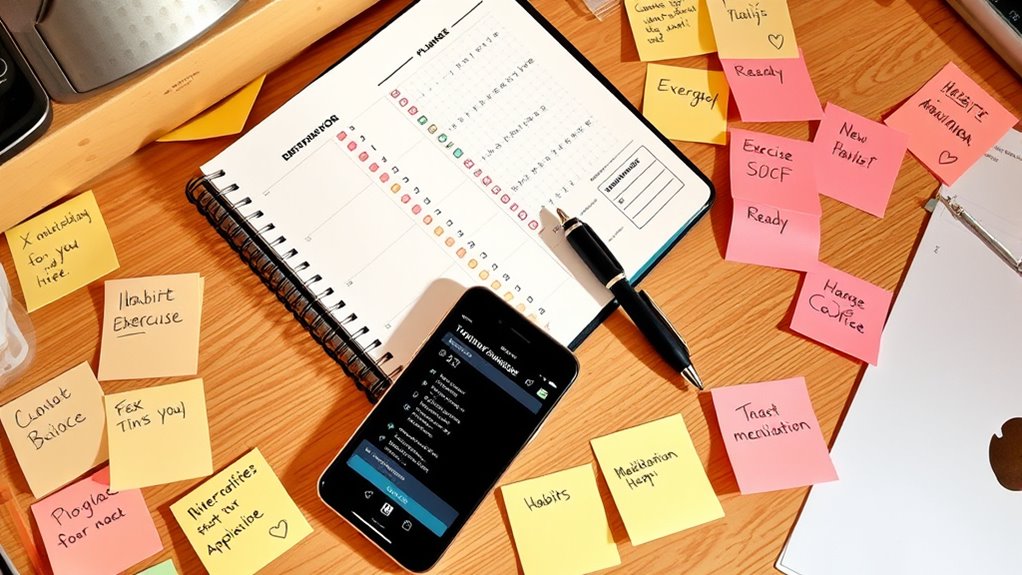Avoid tracking too many habits at once or setting unrealistic goals, as this can overwhelm and discourage you. Use simple, convenient methods for recording progress and celebrate small wins to stay motivated. Regularly review and adjust your plans to keep them relevant, and don’t rely solely on willpower—build routines and environment cues instead. Remember to acknowledge setbacks as growth opportunities. Keep going, and you’ll uncover more strategies to make habit tracking work for you.
Key Takeaways
- Avoid setting overly ambitious or vague goals to prevent overwhelm and stay focused on achievable milestones.
- Limit the number of habits tracked simultaneously to maintain clarity and prevent feeling overwhelmed.
- Simplify tracking methods using user-friendly tools to encourage consistency and reduce skipped entries.
- Regularly review and adjust habits to stay aligned with evolving needs and prevent stagnation.
- Celebrate small wins consistently to boost motivation and reinforce positive progress.
Setting Unrealistic Goals

When you set goals that are too ambitious or vague, it becomes easy to feel overwhelmed and discouraged early on. Instead of aiming for perfection, seek motivation from quotes that inspire steady progress. Remember, small, achievable goals build momentum over time. Incorporate accountability partners into your plan—they can offer support and keep you grounded. Sharing your goals with someone else encourages consistency and honesty. Avoid setting unrealistic expectations that set you up for failure. Instead, focus on clear, specific objectives that challenge you without overwhelming you. By doing so, you’ll stay motivated and maintain confidence. Remember, progress is a journey, not a sprint. Keeping goals realistic ensures you stay committed and inspired to continue your habits long-term. Additionally, understanding the importance of risk management strategies can help you develop a balanced approach to your goals and prevent setbacks.
Tracking Too Many Habits at Once

Trying to track too many habits at once can quickly become overwhelming and counterproductive. When you spread yourself too thin, it’s hard to maintain consistency or see progress. Instead, focus on habit prioritization by choosing a few key habits to develop first. Use habit stacking to combine small behaviors into a single routine, making it easier to manage multiple habits without feeling overwhelmed. For example, pair stretching with your morning coffee or journaling after dinner. By limiting the number of habits you track at any given time, you create a clearer path to success. Incorporating proper tracking methods can further improve your consistency and motivation. Once these habits become ingrained, you can gradually add new ones. This approach keeps your tracking manageable and increases the likelihood of long-term success.
Using Complex or Inconvenient Tracking Methods
When your tracking method is too complex or inconvenient, it can quickly become a chore rather than a helpful tool. Time-consuming processes make it harder to stay consistent, and limited accessibility options mean you might skip tracking altogether. Simplifying your approach keeps it easy to stick with daily. Incorporating user-friendly tools can also enhance consistency and reduce frustration.
Time-Consuming Processes
Using complex or inconvenient tracking methods can quickly turn habit tracking into a tedious chore. When your process is slow or cumbersome, you lose motivation and momentum. These time-consuming processes hinder your ability to maintain consistency, making habit automation harder. Instead of focusing on your goals, you spend more time managing your tracking system. To improve automation efficiency, opt for simple tools or digital apps that streamline data entry and analysis. Quick, intuitive methods encourage regular updates, reducing the risk of skipping days. When tracking feels effortless, you’re more likely to stay committed and see progress. Avoid overly complicated routines that drain your time—aim for habit automation that seamlessly integrates into your daily life. Incorporating mental clarity and health techniques can further enhance your focus and consistency in habit formation. This keeps your focus sharp and your habits on track.
Limited Accessibility Options
Complex or inconvenient tracking methods can severely limit your ability to stay consistent, especially if they aren’t easily accessible across different devices or locations. If your habit tracker lacks thoughtful accessibility design, you might struggle to log progress when you’re on the go or using unfamiliar devices. Relying on intricate systems or outdated technology can create barriers, making it harder to maintain momentum. Incorporating assistive technology can improve accessibility, ensuring everyone, including those with disabilities, can track habits effortlessly. Choosing simple, user-friendly tools that sync seamlessly across platforms helps you stay accountable no matter where you are. When tracking methods are accessible and inclusive, you’re more likely to stick with your habits long-term and avoid unnecessary setbacks. Additionally, high refresh rates in tracking tools can make updating progress smoother and more responsive, further enhancing user experience.
Ignoring Small Wins and Progress

It’s easy to overlook small wins when you’re focused solely on big goals, but ignoring these minor progress points can hinder your motivation. Celebrating progress and recognizing small wins helps reinforce positive habits and keeps your momentum going. When you notice even tiny improvements, you boost your confidence and stay committed. To illustrate, consider this table:
| Small Win | Feeling/Result |
|---|---|
| Completing a workout | Increased energy |
| Drinking more water | Better focus |
| Finishing a task early | Reduced stress |
| Consistently tracking habits | Sense of accomplishment |
Additionally, incorporating aquatic exercise into your routine can make recognizing small progress even more rewarding by providing a refreshing environment that encourages consistent effort.
Forgetting to Review and Adjust Your Plan

If you don’t schedule regular check-ins, you might miss signs that your plan isn’t working. Being flexible allows you to modify your habits as needed, rather than sticking rigidly to a failing routine. Regular reviews help keep your progress on track and ensure your plan evolves with your needs. Incorporating community engagement into your review process can provide valuable feedback and fresh ideas for improvement.
Schedule Regular Check-ins
Many people forget to schedule regular check-ins, which can cause their habits to stagnate or become less effective over time. Without consistent reviews, you might miss signs of burnout or plateaus. To stay on track, set digital reminders to prompt weekly or biweekly check-ins. Enlist accountability partners to provide honest feedback and encouragement. During these sessions, assess your progress and adjust your plan as needed. Here’s a quick guide to effective check-ins:
| Frequency | Tools | Focus Area |
|---|---|---|
| Weekly | Digital reminders | Progress review |
| Biweekly | Accountability partners | Adjustments & motivation |
Regular check-ins keep your habits dynamic, ensuring continuous growth. Incorporating effective tracking methods can enhance your ability to monitor progress accurately.
Flexibility Is Key
Even when you’re making steady progress with your habits, neglecting to review and adjust your plan can stall your growth. An adaptive mindset is essential—you need to be willing to modify your approach based on what’s working and what’s not. Sticking rigidly to a plan that doesn’t fit your current circumstances or energy levels can lead to burnout or frustration. Regularly reviewing your progress allows you to identify areas needing change and implement personalized approaches that better suit your lifestyle. Flexibility ensures your habits remain sustainable and relevant. Don’t be afraid to tweak your routines or set new goals as you evolve. Being mindful of expiration dates and how they relate to your habits can help you stay aware of when adjustments are needed. By staying adaptable, you maximize your chances of long-term success and maintain momentum on your habit-building journey.
Relying Solely on Willpower

Relying solely on willpower to maintain your habits often leads to burnout and inconsistent progress. Willpower fatigue sets in when you constantly resist temptations or push through discomfort, making it harder to stay committed. During motivation dips, you might find yourself skipping workouts or neglecting your goals altogether. This reliance creates a cycle where your initial enthusiasm wanes, and habits become harder to sustain. Without alternative strategies, you risk giving up when willpower alone isn’t enough. To avoid this, build systems that reduce the need for constant self-control—such as automating routines or creating environment cues. Recognizing that willpower isn’t limitless helps you develop sustainable habits that don’t depend solely on your mental strength. Additionally, engaging with community engagement can provide accountability and motivation, reinforcing your habits through social support.
Not Celebrating Milestones

Focusing solely on pushing through your habits without acknowledging progress can make the journey feel unrewarding and lead to burnout. Celebrating milestones with simple celebration rituals helps you recognize your efforts and stay motivated. Instead of rushing to the next goal, take time to enjoy your achievements, no matter how small. Motivational rewards, like treating yourself or sharing your success, reinforce positive behavior and build momentum. These moments of acknowledgment boost your confidence and remind you why you started. By intentionally celebrating your progress, you create a more enjoyable and sustainable habit-forming process. Skipping this step can make progress feel like a grind, so make sure to pause, reflect, and celebrate each milestone along the way.
Giving Up After Setbacks

Setbacks are a natural part of building new habits, but many people give up when faced with them instead of pushing through. To avoid this, focus on mindset shifts that view setbacks as learning opportunities rather than failures. Recognize that progress isn’t always linear and that setbacks are part of growth. Enlist accountability partners who can provide support and encouragement during tough times, helping you stay committed. When you stumble, remind yourself of your “why” and adjust your approach rather than abandoning your goals altogether. Remember, persistence is key. By shifting your perspective and relying on accountability, you’ll develop resilience and keep moving forward, even when setbacks occur. These strategies ensure setbacks don’t become permanent roadblocks.
Frequently Asked Questions
How Can I Stay Motivated Over the Long Term?
Staying motivated long-term can be tough, but you can do it by setting up rewards that keep you inspired and accountable. Celebrate small wins to boost your confidence, and share your goals with friends or join a group to stay accountable. When you track your progress and reward yourself along the way, you’ll find it easier to stay committed and motivated, making your habit-building journey more enjoyable and sustainable.
What Tools Are Best for Effective Habit Tracking?
Imagine your habits as seeds that need nurturing; choosing the right tools is like watering them. Digital apps act as sunlight, providing instant feedback and reminders, while paper journals are like fertile soil, offering a tactile connection. Both are effective for habit tracking—pick the one that feels most natural to you. Whether digital or paper, consistent use helps your habits grow strong and steady.
How Do I Build Habits Without Feeling Overwhelmed?
To build habits without feeling overwhelmed, focus on mindful consistency and set realistic expectations. Break your goals into small, manageable steps, and celebrate each achievement. Avoid rushing; instead, gradually integrate new habits into your routine. Stay patient and flexible, knowing progress takes time. By maintaining a steady, mindful approach, you’ll develop habits sustainably and feel more motivated along the way.
Can Social Support Improve My Habit Formation?
Yes, social support can substantially boost your habit formation. With social encouragement, you stay motivated and committed, especially on tough days. Accountability partners keep you honest and focused, making it easier to stick to your goals. Sharing progress and challenges creates a sense of community and accountability, which enhances your chances of success. So, involve friends or join groups to leverage social support for better habit-building results.
What Mistakes Do Beginners Commonly Make?
Imagine you’re planting a garden; beginners often overlook common pitfalls like overwatering or planting too many seeds at once. Similarly, beginner errors in habit tracking include setting unrealistic goals, tracking inconsistently, or neglecting to celebrate small wins. These mistakes can hinder growth and motivation. To thrive, focus on manageable steps, stay consistent, and recognize progress—like tending to your garden with care, patience, and attention to detail.
Conclusion
By avoiding these common habit tracking mistakes, you’ll stay motivated and make steady progress. For example, imagine someone aiming to exercise daily but feeling overwhelmed by complex methods—simplifying their plan and celebrating small wins keeps them going. Remember, consistency beats perfection. Keep your goals realistic, review regularly, and celebrate every milestone. Small steps lead to big changes, so stay patient and persistent—you’re capable of creating lasting habits that truly stick.









